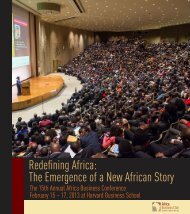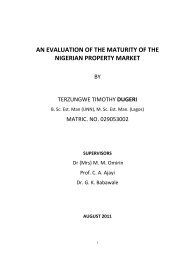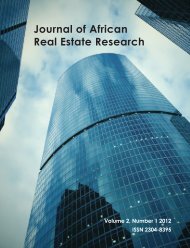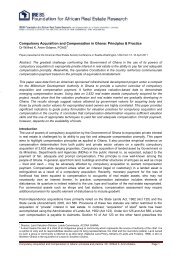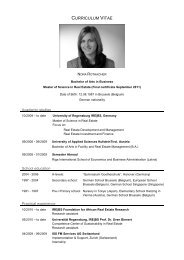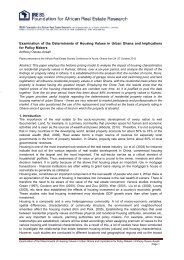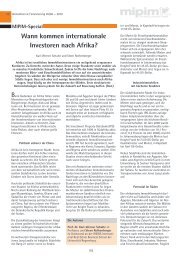protected by this legislation which guarantees the repatriationof funds and interest invested in Namibia.KOEP & PARTNERSFirm InformationWebsite address: www.koep.com.naLanguages spoken: English, Afrikaans, GermanContacts: Peter Koep and Joos AgenbachTelephone: +264 61 382 800Fax: +264 61 382 888Email: pfk@koep.com.na and agenbach@koep.com.naThe present Senior Partner established P F Koep & Company in1982. The name of the firm was changed to Koep & Partners inNovember 2006. The firm maintains contacts with various firmsworldwide, including South <strong>Africa</strong>, Germany, the UnitedKingdom, Asia, Scandinavia and the United States. Koep &Partners offers a comprehensive legal service to clients withbusiness interests in southern <strong>Africa</strong> and focuses on corporateand property work. The firm is a member of <strong>Lex</strong> <strong>Africa</strong> as well as<strong>Lex</strong> Mundi, the world’s leading association of independent lawfirms.Country InformationNamibia is a vast but sparsely populated country, with a totalpopulation of about 2.2 million spread over an area ofapproximately 824 292 square kilometres. Most of thepopulation resides in the central and northern regions of thecountry which are cradled by the Namib desert stretching alongthe cold Atlantic Ocean in the west and the Kalahari semi-desertalong the eastern border with Botswana. The southern areas,bordering on South <strong>Africa</strong>, are also arid. The capital city isWindhoek which has an estimated population of about 300 000.Political SystemMultiparty democracy.Latest GDP FiguresGDP $13 471 billionGDP real growth rate: 4.8%GDP per capita (PPP): US$6 400.Inflation Rate5.9% in 2011.NAMIBIAInvestment ClimateThe government has stakes (often 100% ownership) incompanies in the following sectors: telecommunications (fixedand mobile voice and data services), energy, water, transport(air, rail and road), postal services, fishing, mining and tourism.Namibia welcomes foreign investment, however, and virtuallyall business activities are open to foreign investors. Namibia hasintroduced the Foreign Investment Act which affords protectionto foreign investment in Namibia and introduces an InvestmentCentre within the Ministry of Trade and Industry to streamlineand encourage foreign investment. Foreign nationals areNew enterprises that export to countries outside the Southern<strong>Africa</strong>n Customs Union (SACU) can apply for Export ProcessingZone (EPZ) status. The benefits of an EPZ enterprise are:relief from corporate income tax, import duties, VAT andstamp duties (but not on tax on employees’ income andwithholding tax on dividends);training grants of 75% of training costs;foreign currency bank accounts free of exchange control;relief from certain Labour Act provisions.Foreign ownership of agricultural land is regulated. Thegovernment’s land reform policy is shaped by two key pieces oflegislation: the Agricultural (Commercial) Land Reform Act 6 andthe Communal Land Reform Act 5. Recently, a Land Bill waspublished which attempts to consolidate the two existing acts.This Land Bill, once it is accepted and passed as legislation, willhave a major affect on foreigners investing in agricultural land inNamibia.There is currently no legislation on Black EconomicEmpowerment (BEE) in Namibia. In July 2004, the Office of thePrime Minister announced that it was having consultations onthe content of a BEE policy and its legislative framework for thecountry. It was stated that once consultations had been finalised,the draft policy document would be presented to the Cabinet forapproval and thereafter a Bill would be presented to Parliament.A Transformational Economic and Social EmpowermentFramework (TESEF) was prepared in May 2006. The goals of theTESEF are aimed at empowering previously disadvantagedNamibians and ”Namibianising” the economy. The TESEF is notin force yet and it is uncertain when it will come into force.The Development Bank of Namibia (DBN) provides finance forprivate sector start-ups and expansions, equity deals, bridgingfinance, enterprise development finance, trade finance, smalland medium enterprises, public private partnerships, publicsector infrastructure, local authorities, and bulk finance toresponsible micro-finance providers. The DBN only financesNamibian participation in projects.Forms of BusinessPrivate or public limited liability company;Close corporation;External company (branch of foreign company);Partnership;Trading trust;Sole trading;Co-operatives.Formation of a CompanyCompanies, close corporations and external companies(branches of foreign companies) must be registered with theRegistrar of Companies in Windhoek. The trustees of businesstrusts do not need any authorisation by the authorities beforethey can commence their duties and the regulation of trusts isminimal. A trust deed must, however, beapproved by the Master of the High Court,who must also approve the trustees. Abusiness generally has to register for varioustax purposes such as Value Added Tax (VAT),import VAT, Pay As You Earn (PAYE),57
workmen’s compensation as well as with the Social SecurityCommission. Trading licences are not required.Exchange ControlsAfter independence, Namibia remained part of the South<strong>Africa</strong>n Rand Common Monetary Area which also includes South<strong>Africa</strong>, Lesotho and Swaziland. Although the Namibian Dollarwas introduced as the country’s official currency in 1993, theSouth <strong>Africa</strong>n Rand remains legal tender for an indefinite period.The two currencies are also freely exchangeable on a one for onebasis in Namibia. For as long as Namibia remains part of theCommon Monetary Area, its foreign exchange transactions mustbe conducted in accordance with South <strong>Africa</strong>n exchangecontrol policies and regulations. If Namibia withdraws from theCommon Monetary Area, it is likely that exchange controlprovisions similar to those in South <strong>Africa</strong> will be introduced.Exchange control in Namibia is administered by the Bank ofNamibia (the central bank of Namibia) in conjunction with theSouth <strong>Africa</strong>n Reserve Bank, and through authorised dealers,commercial and merchant banks.Exchange control approval is required for all transactions byNamibian residents (whether natural or juristic persons) whichinvolve the transfer of assets to countries outside the CommonMonetary Area. Residents are not allowed to transact businessin foreign currencies. Transactions may be invoiced in foreigncurrencies, but payments must be made in local currency.There are also certain limitations on the amount of localcurrency available for residents each year in respect of foreigntravel and study.With regard to non-residents:no restrictions apply when foreign funds are introducedinto Namibia as share capital;share certificates must be endorsed “Non-Resident”;companies owned by non-residents should observe a ratioof share capital to fixed assets of 1:1;the introduction of loan funds from abroad is subject tospecific exchange approval.TaxationNormal tax is levied on the taxable income accruing tocompanies, trusts and individuals from sources within ordeemed to be within Namibia. The standard corporate tax rate isa flat tax rate of 35%. Individuals are taxed on a sliding scale. Themaximum tax rate for individuals is 36%. Insurance companiesare effectively taxed at 14% of investment income and miningcompanies at 37.5% (although diamond mines are effectivelytaxed at 55%). There is no capital gains tax or estate duty. There isno taxation on local dividends from companies and distributionsfrom close corporations paid to residents, but dividendsaccruing to foreign residents are subject to a non-residentshareholders’ tax of 10%. Non-resident shareholder’s tax of 10%is deducted from dividends received by non-residentshareholders that do not carry on business in Namibia. Royaltiespaid to non-residents are subject to a 10.5% withholding tax.Double tax agreements may override Namibian withholdingtaxes as well as taxation of deemed sourceincome. Namibia has double tax treaties withBotswana, France, Germany, India, Malaysia,Mauritius, Romania, Russia, South <strong>Africa</strong>,Sweden and the UK. Namibia is currentlynegotiating treaties with Belgium, the58Seychelles, Singapore, Zambia and Zimbabwe.VAT is charged at an effective rate of 15%. The import of goodsor services is subject to VAT at 15% unless the goods or servicesare exempt. Imports by areas declared as Export ProcessingZones are exempt from VAT. The export of goods is not subject toVAT. Customs duty is also payable.Legal SystemNamibian law is based on Roman and Roman-Dutch law and is,because of the country’s history, influenced by South <strong>Africa</strong>n lawand, to a certain extent, by German and English law. Because theNamibian legal system shares its roots with the South <strong>Africa</strong>nlegal system and has developed in close connection to the South<strong>Africa</strong>n legal system, much use is made of South <strong>Africa</strong>n case lawand authorities when interpreting and applying Namibian law.Namibia adheres to the principles of the supremacy of theConstitution and the independence of the judiciary.Intellectual PropertyRights to intellectual property are protected under Namibianlaw, largely by statute, but also at common law. Some of thestatutes overlap with the common law and with each other.Patents and designs are governed by an old South <strong>Africa</strong>n Act,the Patents Designs, Trade Marks and Copyright Act 9 of 1916.Trademarks are governed by the Trademarks Act. Regulationsspecify the procedures to be followed by applicants, andprotection is afforded from the date of filing, if the application isgranted. The common law recognises that an unregistered markused by a trader which distinguishes such trader’s goods orservices from those of others is of a proprietary nature anddeserves protection. The Trademarks Act recognises suchcommon law rights by preserving the right to bring an action forpassing off of the unregistered mark.Any of the works listed in the Copyright and Neighbouring RightsProtection Act are eligible for copyright protection. Copyrightcomes into existence without registration and the Act prohibitsthe unauthorised reproduction, publication, broadcast,performance, transmission or adaptation of a literary, dramaticor musical work. Special provision is made for the protection ofartistic works, and of sound recordings, cinematograph films,television and sound broadcasts, published editions of worksand computer programs.Financial Services/InsuranceNamibia has a well-established insurance industry which is to agreat extent inherited from and interlinked with the South<strong>Africa</strong>n insurance industry. Insurance is divided into long-terminsurance (pertaining to life insurance, health, disability, funeralor sinking fund policies) and short-term insurance (relating tofire, marine, aviation, vehicles, guarantee and personal accident,sickness, general liability, damage to property, goods in transit,credit, railway rolling stock, legal expenses and expropriationand confiscation of property, personal and co-insurancebusiness). Long-term and short-term insurance and theregistration, cancellation and carrying on of business in relationthereto are regulated by the Long-Term Insurance Act and Short-Term Insurance Act. Most types of risk can be insured in Namibiaand the reinsurance business has gained a lot of ground in thecountry in recent years, in particular since the introduction ofthe State owned National Re-Insurance Company, NamibiaFinancial Institutions Supervisory Authority (NAMFISA).



